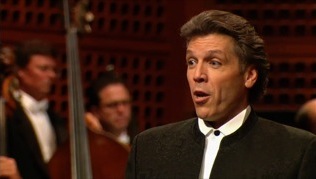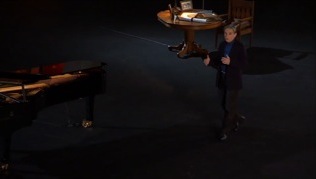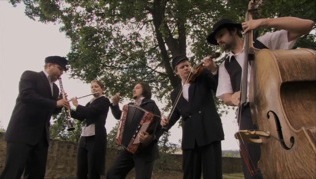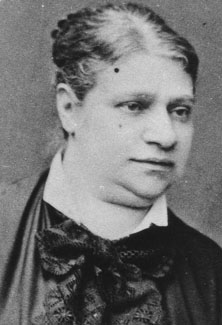Mahler wrote songs to his own words and those of others. Then he re-used them as themes in his symphonies, where they add new dimension to the instrumental music.
 Play
Play
The principal theme in the first movement of his First Symphony was first used by Mahler years before in one of his Songs of a Wayfarer. “I Walked Across the Fields This Morning” (Ging heut’ morgen übers Feld). One morning, striding across the dew-laden fields, the lovelorn narrator briefly escapes from his grief by opening himself to nature. The finch sings to him: “Isn’t it a beautiful world? Well, then?”
 Play
Play
On many occasions in his earlier symphonies, Mahler brought whole passages from his songs into the epic worlds of his symphonies.
-
The central portion of the First Symphony’s slow movement is a restful passage of gentle simplicity that takes us far from the gloom of the funeral march.
-
Mahler is recalling the moment in the fourth Song of a Wayfarer, where the narrator forgets his troubles and falls asleep beside the road, under a linden tree. “On the road stands a linden tree. There I slept peacefully for the first time.”
 Play
Play

One of the many humorous songs in the Magic Horn (Wunderhorn) series is “St. Anthony’s Sermon to the Fish” (St. Antonius Fischpredigt).
-
It tells of Saint Anthony futilely preaching a sermon to the fishes: "St. Anthony arrives for his sermon and finds the church empty. He goes to the rivers to preach to the fish. They flick their tails, which glisten in the sunshine."
-
In the third movement of the Second Symphony Mahler expands this whimsical trifle into a whirling scherzo. It’s interesting to compare the resourcefulness of the instrumental effects, as well as the humorous way that the main theme seems to chase its own tail in a never-ending flow of sixteenth notes, with Mahler’s real-life efforts to build a career. He too often felt that he was “preaching” to unappreciative critics and audiences.
-
As the fourth movement of the Second Symphony, Mahler’s orchestration of the Magic Horn (Wunderhorn) song “Primal Light” (Urlicht) comes as a counterfoil to the comic tale of effort and frustration of the previous movement. Its spiritual certainty points the way to the transfiguration depicted in the finale’s last pages.

-
Mahler originally intended to incorporate his setting of the Magic Horn (Wunderhorn) poem "Heavenly Life" (Das himmlische Leben) into his third symphony. However, the song finds a natural place at the end of the Fourth Symphony where its description of a child’s dream of what heaven must be like serves to heal all the previous movements’ conflicts. Throughout, the voice of the soprano soloist guides the listener like a beacon of light around which Mahler’s imaginative orchestral colors flicker joyfully: "Should a day of fasting come along, all the fish come swimming happily! There goes Saint Peer running with net and bait to the heavenly pond. Saint Martha will be the cook." His friend Natalie Bauer-Lechner recalled that in composing this movement "his mother's face, recalled from childhood, had hovered before his mind's eye; sad and yet laughing, as if through tears."

